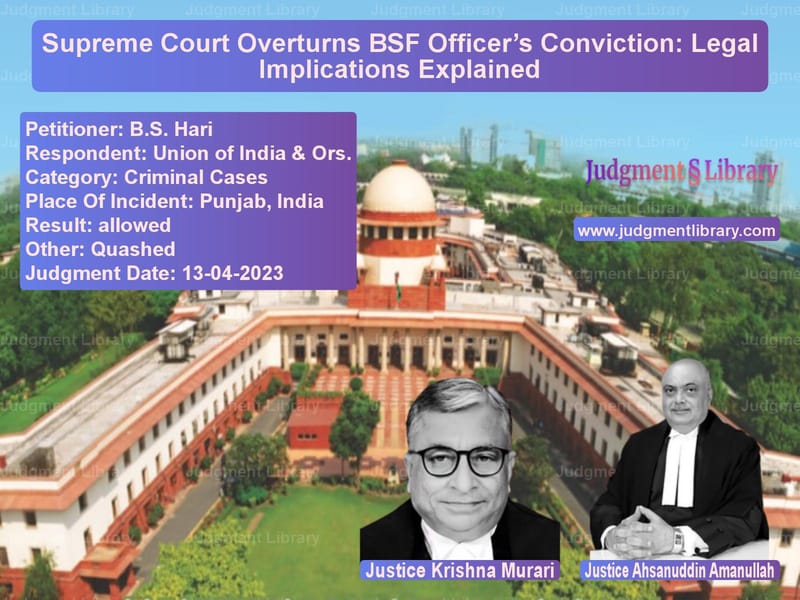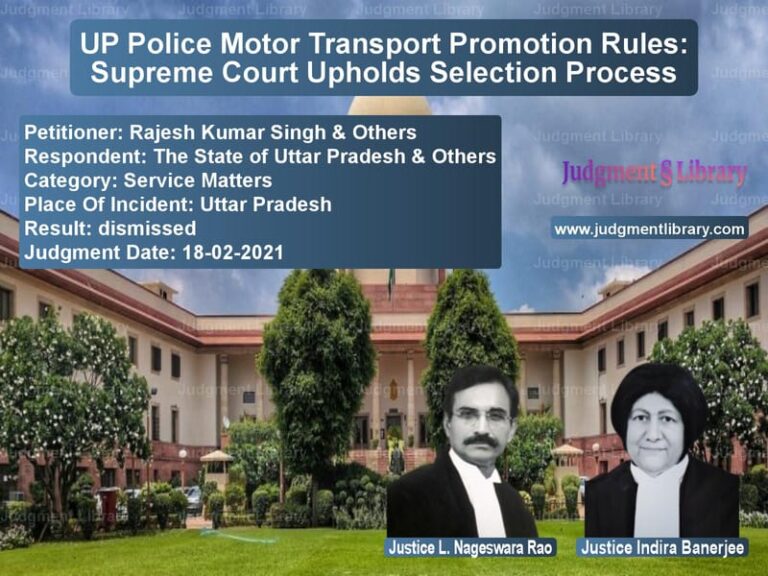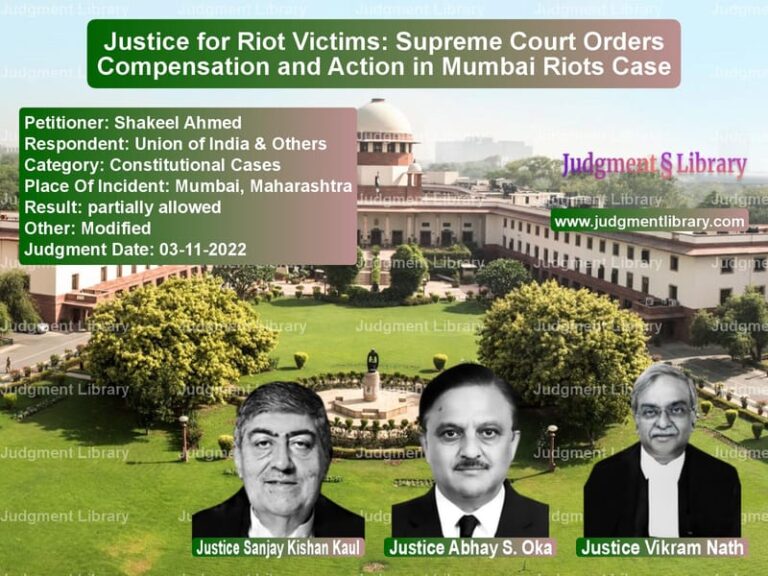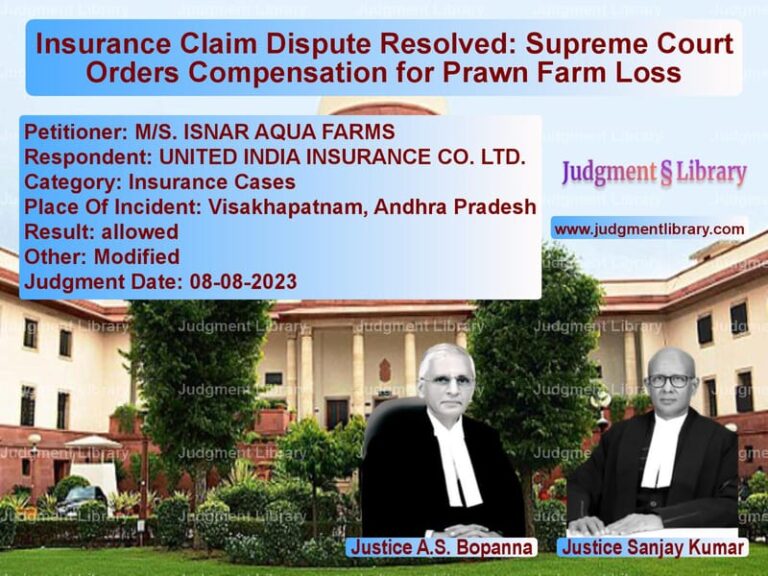Supreme Court Overturns BSF Officer’s Conviction: Legal Implications Explained
The Supreme Court of India, in a significant judgment, overturned the conviction and sentence of B.S. Hari, a former Commandant in the Border Security Force (BSF), who had been found guilty of charges under the Narcotic Drugs and Psychotropic Substances (NDPS) Act and the Border Security Force Act. The case involved allegations of allowing the smuggling of Acetic Anhydride, a controlled substance, across the India-Pakistan border. The court found that the evidence against the appellant was insufficient and that the punishment awarded was disproportionate.
Background of the Case
The appellant, B.S. Hari, joined the Indian Army in 1964 and later became a Commandant in the BSF. He had an unblemished service record, receiving numerous awards, including the President’s Police Medal in 1994. He was transferred to Punjab as the Commandant of the 1956 Battalion (BSF) with headquarters at Mamdot, Punjab.
On April 5, 1995, the local police conducted a search and discovered Jerrycans of Acetic Anhydride in the fields near the border. An FIR was registered against two individuals, Lakhwinder Singh and Surjit Singh, for smuggling. Shortly after, the appellant was placed under arrest and removed from his post.
Following an internal inquiry, the BSF charged him with offenses under the BSF Act and the NDPS Act, leading to his conviction by the General Security Force Court (GSFC). The appellant was sentenced to ten years’ rigorous imprisonment, fined Rs. 1,00,000, and dismissed from service.
Petitioner’s Arguments
- The appellant’s counsel argued that the evidence against him was weak and circumstantial.
- The co-accused, Surjit Singh, was acquitted because he was lodged in Amritsar Jail at the time of the alleged smuggling incident.
- Another co-accused, Lakhwinder Singh, was discharged due to a lack of evidence.
- Despite a search of the appellant’s house, no incriminating material was found.
- Inspector Didar Singh, who was actually in charge of the area, had testified against the appellant, but his statement was unreliable and self-serving.
- The appellant had already retired before being sentenced, making his dismissal from service legally untenable.
- His pension and other retirement benefits were withheld without due process.
Respondent’s Arguments
- The prosecution argued that the contraband could not have been smuggled without the appellant’s knowledge.
- Even though the co-accused were discharged, the role of the appellant as a senior officer responsible for border security warranted punishment.
- Statements from BSF personnel suggested that the appellant had facilitated the smuggling operation.
- The appellant’s dismissal was justified under the BSF Act and NDPS Act.
Supreme Court’s Key Observations
- The court found that the appellant’s conviction was primarily based on the statement of a subordinate officer, which lacked corroboration.
- There was no direct evidence linking the appellant to the smuggling operation.
- The acquittal of the co-accused weakened the case against the appellant.
- The GSFC failed to consider whether the punishment was proportionate to the offense.
- The trial violated several procedural safeguards under the BSF Act.
The court cited multiple precedents to support its ruling:
- In Bhagat Ram v. State of Himachal Pradesh, it was held that any penalty must be proportionate to the misconduct.
- In Ranjit Thakur v. Union of India, the Supreme Court ruled that disproportionate punishment must be overturned.
- In Jitendra Kumar Srivastava v. State of Jharkhand, it was held that pension cannot be withheld without statutory authority.
Final Judgment
The Supreme Court ruled in favor of the appellant:
- His conviction and sentence were quashed.
- He was entitled to full retirement benefits, including pension, gratuity, and other dues.
- The government was directed to process his payments within twelve weeks.
Implications of the Judgment
This case highlights key legal principles in military justice and administrative law:
- Military courts must ensure that punishments are proportionate and based on strong evidence.
- Disciplinary actions should not violate statutory protections under service laws.
- Pension and retirement benefits cannot be withheld arbitrarily.
The ruling reinforces the need for procedural fairness and proportionality in military justice systems while safeguarding the rights of defense personnel.
Petitioner Name: B.S. Hari.Respondent Name: Union of India & Ors..Judgment By: Justice Krishna Murari, Justice Ahsanuddin Amanullah.Place Of Incident: Punjab, India.Judgment Date: 13-04-2023.
Don’t miss out on the full details! Download the complete judgment in PDF format below and gain valuable insights instantly!
Download Judgment: b.s.-hari-vs-union-of-india-&-ors-supreme-court-of-india-judgment-dated-13-04-2023.pdf
Directly Download Judgment: Directly download this Judgment
See all petitions in Bail and Anticipatory Bail
See all petitions in Custodial Deaths and Police Misconduct
See all petitions in Fraud and Forgery
See all petitions in Judgment by Krishna Murari
See all petitions in Judgment by Ahsanuddin Amanullah
See all petitions in allowed
See all petitions in Quashed
See all petitions in supreme court of India judgments April 2023
See all petitions in 2023 judgments
See all posts in Criminal Cases Category
See all allowed petitions in Criminal Cases Category
See all Dismissed petitions in Criminal Cases Category
See all partially allowed petitions in Criminal Cases Category







